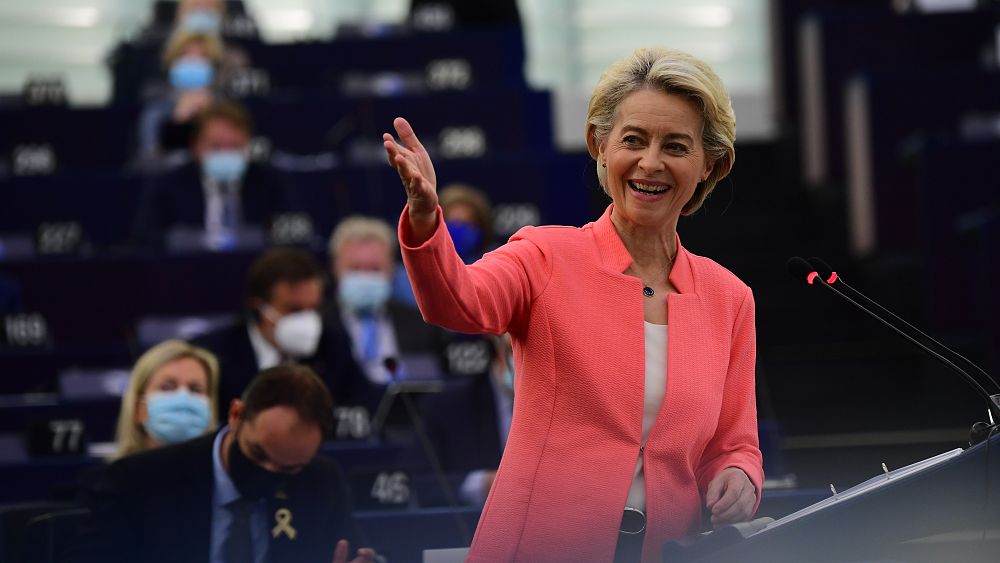
It was Ursula von der Leyen’s big hour, one of the things that happen only once a year – the State of the European Union speech.
Like in the United States, the European Commission President, in an annual speech, takes stock of political achievements of the past year and lays out the political agenda for the upcoming 12 months.
But while the US President’s address to both houses of Congress is prime-time television, the head of the EU executive speaks before the European Parliament at 9 am – guaranteeing that most European citizens will not be watching it at all.
“A pandemic is a marathon. It’s not a sprint. We follow the science. We deliver to Europe. We deliver to the rest of the world. We did it the right way because we did it the European way and I think it worked,” von der Leyen told MEPs on Wednesday.
She praised the European vaccination efforts and committed to donating a further 200 million doses to low and middle-income parts of the world.
She also pledged an additional €100 million in humanitarian aid to Afghanistan, as well as a European defence summit for next year and declared 2022 the year of European Youth.
And she made the fight against COVID and climate change the main EU priorities in the coming year, while also pointing at migration and respect for rule of law as key topics.
At the end of her speech, she surprised the audience by presenting Italian Paralympic gold medalist Bebe Vio as a source of inspiration and an example of struggle and effort, of tenacity and unrelenting positivity.
“This is the spirit of Europes next generation. So let us be inspired by Bebe and by all of the young people who change our perception of the possible; who show us that you can be what you want to be and that you can achieve whatever you believe in. Honourable members. That is the soul of Europe. That is the future of Europe. Let‘s make it stronger,” the Commission President said.
Dara Murphy, former Irish minister of European affairs told Euronews that where von der Leyen was most convincing was on defence and security.
“She mapped out that there’ll be a defence summit and under the French presidency that there will be a communication on NATO declarations between the EU and NATO,” Murphy said. “She talked about the new Security Resilience Act…and she spoke about the danger of laptops and smartphones being a threat to the security of Europe. I think she’s moving in the right direction.”
European Chips Act
Ursula von der Leyen also pitched a new tool to help the EU catch up in the ever-frantic technological race: a European Chips Act.
The act is yet to be formally presented, but the Commission President used her annual speech to make her intentions clear: the EU must create a “state-of-the-art European chip ecosystem”, including production, to guarantee secure and stable supply chains.
Microchips, also known as semiconductors, are the key component behind millions of electronic devices present in our daily life, such as smartphones, computers, cameras, televisions and washing machines.
As the world becomes increasingly digitalised and tech-dependent, semiconductors turn into highly profitable, valuable and coveted products that all countries and companies hanker for. Chips have become such irreplaceable and sensitive gadgets they are now seen through the lenses of national security and geopolitics.
The pandemic has shed further light on the importance of semiconductors. Supply chain disruptions caused by the virus, coupled with a sudden economic recovery and ongoing trade tensions, have triggered a global shortage of chips.
Technology independence is one of the main objectives for proponents of strategic autonomy. While the EU has taken the lead in digital regulation, its manufacturing capacity, investment flows and innovation levels still lag behind the United States and China.
Semi-conductors “is a field where Europe had a lot of leadership. But while worldwide demand is growing, the production in Europe is decreasing”, President von der Leyen told Euronews after her State of the Union speech, referring to the continent’s shrinking market share.
“We really have to act. We have to pull our forces together. And that’s what we are going to do with the European Chips Act that we are going to bring forward [and] bring all the stakeholders together,” she added.
Beefed up EU Blue Card
MEPs in Strasbourg voted to approve reforms to the EU’s Blue Card Directive, designed to facilitate the employment of highly skilled workers from outside the bloc and help plug the gap where labour shortages exist in certain sectors.
Brussels wants to make it easier to attract highly-skilled non-EU workers in sectors like healthcare and information and communication technologies (ICT) where significant shortfalls exist.
Speaking after the vote on Wednesday, the MEP in charge of the Blue Card Directive Javier Moreno Sánchez, said: “We must do everything we can to improve legal migration to Europe and, above all, facilitate the arrival of qualified workers who contribute to the development of our continent.”
“A more attractive and viable scheme adds real value to the existing national schemes. In the future, we intend to go further, so that workers in medium and low-paid jobs can contribute to our society in the same beneficial way that Blue Card holders can now,” the Spanish parliamentarian added.